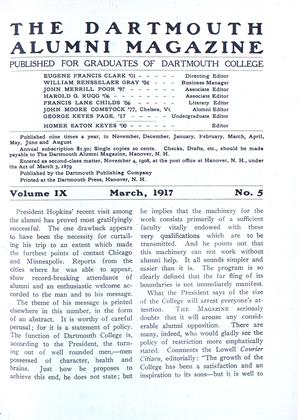The following editorial on the Dartmouth Spirit is taken from the Manchester Union for January 29:
"As a rule reporters take things pretty much as they come, covering an assignment as all in the day's work, with fairness and fidelity, but most often being gripped by it so that their personality is lifted out of professionalism. It takes a really gripping thing to do that. When they get into a Dartmouth College gathering, however, they undergo a transformation. There is something in the meeting that gets hold of them. Latent enthusiasms are awakened. They not only feel the throbbing pulsations of the thing itself, but they see visions. Nor is the influence of the gathering dispelled when contact ceases. When the reporters get down in front of their typewriters they write like Dartmouth men who are putting Dartmouth's realities and its dreams into living words. To read some of the newspaper accounts of the alumni meeting at Boston last week was to be in the meeting.
"Now if the spirit of a Dartmouth Alumni meeting can communicate itself to men who never even saw the buildings, which it does, through the medium of the newspaper, what may not the spirit of the college be doing as it pours itself out through living men in all parts of the country? For Dartmouth is no longer an almost exclusively New England institution. As President Hopkins told the Bostonians, fifteen years ago 76 per cent of the collegians came from these six states; now 48 per cent come from other parts of the land. So almost half of every graduating class goes out to help incorporate the Dartmouth idea into our American thought and life.
"What the idea is, President Hopkins tells us whenever he is called upon to speak to the world outside the College. It is the college as distinct from the university idea—the broadly cultured conception as distinct from that of specialization. But is it not that of intellectual culture altogether. 'The College exists primarily for scholarship,' says the president, 'but its purpose is also to produce the good man, the man of brains, the man of health, the man of character.' This is not a creature of the cloister. When he meets his fellow, there is fellowship. Collectively, these good fellows suggest the idea of dynamic vitality. The spirit of the whole can be no different in its quality than that of the parts, and so we must think of it as that of sound culture in action.
"It is a fine thing to reflect upon that New Hampshire, which gave so much of itself to the building of the West is still contributing to the nation an ideal of this sort through the medium of its great college. There is no question at all that it is doing so. Were all this a mere matter of theory there would be no Dartmouth spirit to warm the cockles of the heart and set reporters fingers tingling as they write the stories of Dartmouth doings. A current of fine culture and red-blooded virility which runs throughout the length and breadth of the land has its source in Dartmouth College."
 View Full Issue
View Full Issue
More From This Issue
-
 Article
ArticlePresident Hopkins' recent visit among the alumni has proved most gratifyingly successful.
March 1917 -
 Article
ArticleTHE PRESIDENT AMONG THE ALUMNI
March 1917 -
 Article
ArticleTHE GRADUATE CLUB
March 1917 By Harry E. Burton -
 Article
ArticleTHE UNDERGRADUATE MONTH
March 1917 -
 Article
ArticleGEOGRAPHICAL DISTRIBUTION OF SCHOOLS SENDING STUDENTS TO DARTMOUTH
March 1917 By Howard Murray Tibbetts '00 -
 Books
BooksSaints Legend
March 1917
Article
-
 Article
ArticleFrom a 1908 Mem Book
June 1934 -
 Article
ArticleAlumni Fund Award
JUNE 1973 -
 Article
ArticleSt. Petersburg
October 1973 By ALBERT G. MACDONALD '27 -
 Article
ArticleThe Undergraduate Chair
November 1940 By Charles Bolte '41 -
 Article
ArticleSports Schedule
February 1961 By CLIFF JORDAN '45 -
 Article
ArticleSoccer
November 1951 By Francis E. Merrill '26

